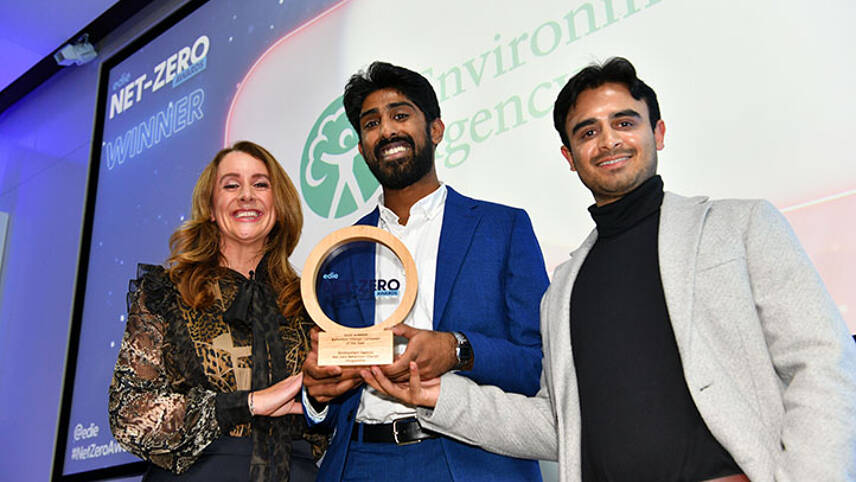This premium content is exclusive to edie Members.
To find out more about edie Membership, please click below.
If you are an existing member, login here

At a glance
Who: The Environment Agency
What: Award-winning behaviour change programme
Where: Across UK staff locations
When: Ongoing
Why: To empower and educate staff in order to meet a net-zero goal set for 2030
The challenge:
Reaching net-zero requires everyone to play their part, but for many organisations, workers are time-poor and facing increasing pressure, competing priorities and initiative fatigue, who also have varying levels of understanding and buy-in when it comes to decarbonisation. As such, behaviour change needs to be simple and non-intrusive.
The solution:
EA staff are now putting carbon at the heart of every decision thanks to trailblazing, practical interventions developed to change behaviour and organisational culture, becoming the first government body to be Gold-level accredited by the Carbon Literacy Trust.
How it works:
In order to implement internal changes to build toward an ambitious net-zero target, the EA has worked tirelessly to introduce a tailored training package that would aim to make conversations around decarbonisation simple and part of everyday corporate conversations, regardless of role.
Doing so would require the company to understand, collate, analyse, and present the right carbon information, in a way that would be relevant and applicable to all staff. The EA decided that they wanted to be able to showcase a carbon footprint breakdown of activities ranging from building large capital flood defences to measuring individuals’ commuting carbon.
Working with the Carbon Literacy Trust, the EA developed a package of free, bespoke carbon literacy training for staff comprised of bite-sized modules to be flexibly completed around workload, which covered climate science, the EA’s net-zero ambition, and practical actions for carbon reduction.
This tool enabled staff to be both accountable and responsible for their carbon budgets across the organisation and crucially to integrate carbon budgeting into business and finance process, governance and decision making.
To build on this programme, the EA also introduced a system of carbon budgeting, as an operational constraint to treat carbon like they would finances in a bid to limit emissions.
Budgets accounted for both capital and operational carbon impacts. The programme aimed to encourage EA staff to embed carbon considerations into business decisions. A self-service dashboard was set up that allows staff to better see, understand and manage the budgets.
The dashboard and available data was then integrated into management strategies and led to the EA tweaking their current engagement and communications strategy, which now better informs the 11,000+ internal and external stakeholders.
The results:
The whole process has been geared towards enabling all EA staff and stakeholders, of which there are more than 11,000 people – ranging from organisational leadership to operational, field-based staff, to engineers, to fish experts – to take action to cut their individual carbon footprint.
More than 7,000 staff have completed carbon literacy training and pledged to take individual action to reduce emissions, with a further 2,000 awaiting accreditation at the time of the Awards. The EA claims that the combined number is more than any other organisation in the world.
Whole teams have now changed how they work, with field teams developing specific carbon-neutral strategies and others looking to switch to electric equipment and e-bikes.
The roll-out of carbon budgets and dashboards has been used by more than 7,500 staff, who use them for guiding project appraisals in large capital schemes down to informing travel choices.
The organisation:
The EA has committed to reaching net-zero by 2030.
By 2020, the EA had already reduced its direct emissions by 47%, however, with the organisation targeting a 45% reduction in emissions across the supply chain by 2030, work on decarbonisation needs to be amplified.
The EA has also stated it will offset all remaining emissions through projects that will “harmlessly lock up carbon and offer wider benefits, such as reduced flood risk and more habitat to boost biodiversity”.
The behaviour change strategy will also be crucial to helping the EA reduce the 8,000 tonnes of emissions from its buildings. The EA is aiming to reduce emissions from buildings by 45% by 2030.
The judges said:
“The EA trained nearly all their staff in carbon literacy and then followed this up with allocating carbon budgets across all workstreams so that the initiative, to reach net-zero, fed through across the organisation in the long term.
“This is also a great example that we hope will be replicated across all Government departments as a key procurement power.”
© Faversham House Ltd 2024 edie news articles may be copied or forwarded for individual use only. No other reproduction or distribution is permitted without prior written consent.

